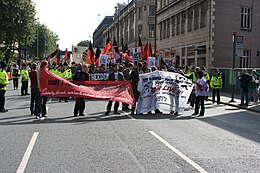
Back اللاسلطوية في المملكة المتحدة Arabic Anarquismo en Reino Unido Spanish Anarchisme au Royaume-Uni French אנרכיזם באנגליה HE Anarquismo na Inglaterra Portuguese

| Part of a series on |
| Anarchism |
|---|
 |
Anarchism in the United Kingdom initially developed within the religious dissent movement that began after the Protestant Reformation. Anarchism was first seen among the radical republican elements of the English Civil War and following the Stuart Restoration grew within the fringes of radical Whiggery. The Whig politician Edmund Burke was the first to expound anarchist ideas, which developed as a tendency that influenced the political philosophy of William Godwin, who became the first modern proponent of anarchism with the release of his 1793 book Enquiry Concerning Political Justice.
The development of socialism from radicalism started in the 1860s with the establishment of the International Workingmen's Association (IWA), and saw the foundation of a number of workers' societies demanding radical reform and civil liberties. By the 1870s, anarchism had been introduced to the country from Europe and America and the establishment of the Labour Emancipation League (LEL) in 1881 marked the beginning of the organized anarchist movement in the United Kingdom. The LEL was instrumental in the foundation of the Socialist League, which in 1888 came under the control of the anarchist Frank Kitz.
The Socialist League's newspaper Commonweal and Peter Kropotkin's newspaper Freedom saw anarchism through the turn of the 20th century. Anarcho-communism became a major tendency during the Revolutions of 1917–1923, when the Glasgow anarchist Guy Aldred established the Anti-Parliamentary Communist Federation and later the United Socialist Movement. The rise of anarcho-syndicalism after the Spanish Civil War eventually resulted in the foundation of the Solidarity Federation in 1950, followed by resurgence of anarcho-communism during the 1980s, when the Class War and Anarchist Federation were founded.
© MMXXIII Rich X Search. We shall prevail. All rights reserved. Rich X Search